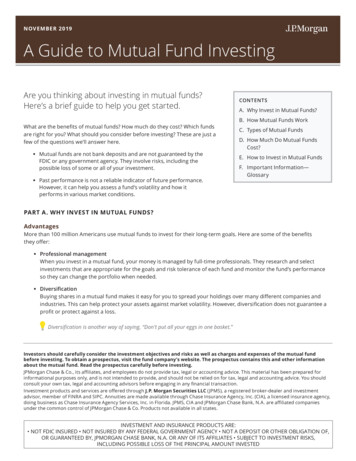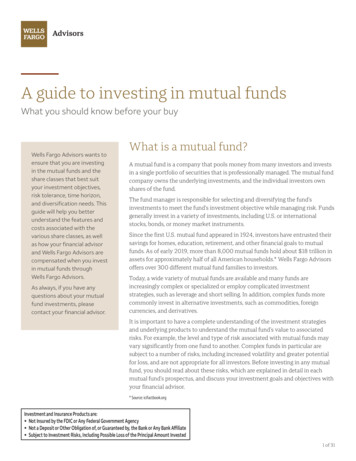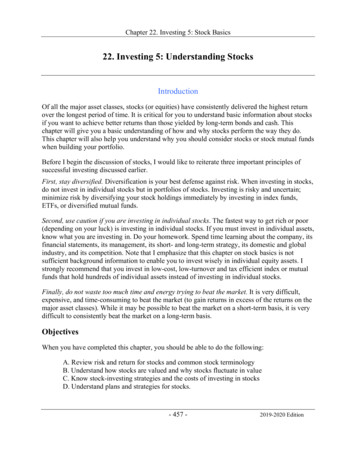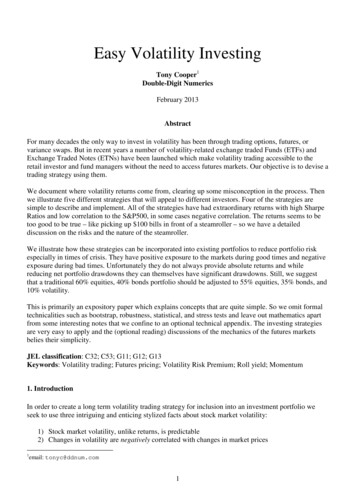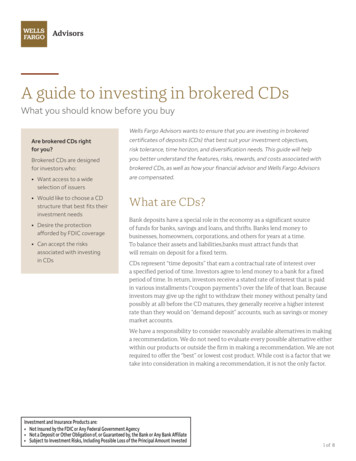
Transcription
A guide to investing in brokered CDsWhat you should know before you buyWells Fargo Advisors wants to ensure that you are investing in brokeredAre brokered CDs rightfor you?Brokered CDs are designedfor investors who:certificates of deposits (CDs) that best suit your investment objectives,risk tolerance, time horizon, and diversification needs. This guide will helpyou better understand the features, risks, rewards, and costs associated withbrokered CDs, as well as how your financial advisor and Wells Fargo Advisors Want access to a wideselection of issuersare compensated. Would like to choose a CDstructure that best fits theirinvestment needsWhat are CDs? Desire the protectionafforded by FDIC coverage Can accept the risksassociated with investingin CDsBank deposits have a special role in the economy as a significant sourceof funds for banks, savings and loans, and thrifts. Banks lend money tobusinesses, homeowners, corporations, and others for years at a time.To balance their assets and liabilities,banks must attract funds thatwill remain on deposit for a fixed term.CDs represent “time deposits” that earn a contractual rate of interest overa specified period of time. Investors agree to lend money to a bank for a fixedperiod of time. In return, investors receive a stated rate of interest that is paidin various installments (“coupon payments”) over the life of that loan. Becauseinvestors may give up the right to withdraw their money without penalty (andpossibly at all) before the CD matures, they generally receive a higher interestrate than they would on “demand deposit” accounts, such as savings or moneymarket accounts.We have a responsibility to consider reasonably available alternatives in makinga recommendation. We do not need to evaluate every possible alternative eitherwithin our products or outside the firm in making a recommendation. We are notrequired to offer the “best” or lowest cost product. While cost is a factor that wetake into consideration in making a recommendation, it is not the only factor.Investment and Insurance Products are: Not Insured by the FDIC or Any Federal Government Agency Not a Deposit or Other Obligation of, or Guaranteed by, the Bank or Any Bank Affiliate Subject to Investment Risks, Including Possible Loss of the Principal Amount Invested1 of 8
You should consider factors such as those below prior to acceptinga recommendation: The potential risks, rewards, and costs in purchasing and in the futureselling of an investment. Your age, other investments, financial situation and needs, tax status,investment objectives, investment experience, investment time horizon,liquidity needs, and risk tolerance. The investment’s investment objectives, characteristics (including anyspecial or unusual features), liquidity, volatility, and likely performancein a variety of market and economic conditions. For complex products, you should consider whether less complex orcostly products achieve the same objectives.By accepting a recommendation, you acknowledge that you have consideredthe above factors to your satisfaction.What are brokered CDs?Most investors are familiar with the type of CDs that can be purchasedat a local bank branch. Many banks are highly motivated to gain depositorsbeyond local walk-in customers. As a result, banks may use the nationwidebrokerage community for distribution of CDs. The CDs obtained in this mannerare referred to as “brokered” CDs. Like CDs purchased at a bank, or any otherbank deposit, brokered CDs are backed by the full faith and credit of the U.S.government through Federal Deposit Insurance Corporation (FDIC) insuranceup to FDIC limits. Keep in mind that FDIC insurance does not cover losses ofprincipal (the initial investment amount) that are due to market fluctuationof principal or any amounts paid over the face value of the CD.Brokered CDs, then, are simply CDs that are issued by banks, purchased inbulk by securities firms, and sold to clients through financial advisors. CDtransactions can be easily executed within a brokerage account with just aphone call to a financial advisor. Investors do not receive physical certificatesfor their brokered CDs, but instead receive a periodic account statementdetailing their CD holdings.Brokered CDs come in two basic forms—non-callable and callable.Non-callable CDsMaturities generally range from three months to 10 years. Non-callable CDsare available in fixed-rate or zero-coupon structures.Callable CDsCallable CDs can be called by the issuing bank (the “issuer”) before maturity.To achieve flexibility in managing their balance sheets, banks generally rewardCD investors with a higher rate of interest on callable CDs in return for the rightto call (pay back) the investor’s principal before the CD’s stated maturity date.A CD is called at the bank’s discretion only. Callable CDs are offered in a wide2 of 8
range of maturities— typically three to 20 years. The non-call or “lockout” period(the time during which an issuer cannot call the CD) is usually six months to fiveyears. Callable CDs are generally available in fixed-rate, step-up, andzero-coupon structures.What causes a callable CD to be called?After the initial non-call period, the issuing bank has the right (but not theobligation) to call the CD for any reason before its stated maturity. As a practicalmatter, an issuer will generally decide to call a CD when it can issue a new CD ata lower interest rate than the existing CD. Individuals considering an investmentin callable CDs should note that it is unlikely that they would be able to replacetheir called CD with one that pays an equivalent interest rate under this scenario.Risks of callable CDsCallable CDs can be issued with longer maturities. For this reason, investorsshould purchase a callable CD only if they understand that the timing of thereturn of principal may be uncertain because of the call feature and may,in fact, be at the maturity date.Callable CDs may be paid off before maturity as a result of a call by the issuer.In certain cases, the total return may be less than the yield the CD would haveearned had it been held to maturity. As noted earlier, if the issuer calls the CD,investors may be unable to reinvest the funds at the rate of the original CD.If it is not called, investors should be prepared to hold the CD until maturity.If a callable CD is sold before maturity, the value of the CD will be subject tomarket conditions, including, but not limited to, interest rate changes, whichcould result in a significant loss from the initial investment amount. This featureis true of all brokered CDs. However, because callable CDs tend to have longermaturities, their price sensitivity to interest rate changes is greater.CD StructuresFixed-rate CDs—This CD structure is the simplest and most common in themarket-place. Fixed-rate CDs can be issued as either non-callable or callable.The CD’s coupon, or interest rate, is set at issuance and remains the same untilmaturity or until the CD is called by the issuing bank. Interest payments aremade monthly or semiannually, or at maturity for issues of one year or less.Investors who require consistent income may find fixed-rate CDs appropriate.Step-up CDs—The step-up CD is typically issued only in callable form.It provides a variation on the simple fixed-rate CD by offering a predeterminedschedule of coupon rates, which begin somewhat below those of current fixedrate CDs and gradually increase over a specified timeframe. The coupon may“step up” (increase) only once or as often as quarterly until the issuer callsthe CD or the CD matures.Floating-rate CDs—Floating-rate CDs are CDs that pay interest based upon apredetermined spread over a reference rate or index. Floating-rate CDs presentdifferent investment considerations than fixed-rate or step-rate CDs. Dependingon the type of floating-rate CD and the interest rate environment, the CD maypay substantially more, or substantially less, interest over the term of the CD3 of 8
than would be paid on a fixed-rate or step-rate CD of the same maturity.In addition, if the CD is subject to call by the issuer: (1) you may not receivethe benefits of any anticipated increase in rates paid on a floating-rate CDif the CD is called, or (2) you may be required to hold the CD at a lower ratethan prevailing market interest rates if the CD is not called. You shouldcarefully review any supplemental material that describes the floating-rateand the basis for resetting the coupon. Also, if the CD is subject to call bythe issuer, learn about the time periods when the issuer may call the CD.Jumbo CDs—Jumbo CDs are CDs that are issued in 100,000 denominations.Once issued, Jumbo CDs may not be resold in denominations of less than 100,000. In the event you choose to sell a Jumbo CD prior to maturity, youshould be aware that large denomination CDs may be less liquid, which couldlead to a less favorable pricing, than smaller denomination CDs. In addition,Jumbo CDs are issued in a master certificate that is held by Wells Fargo Advisors,not the Depository Trust Company. This means that Jumbo CDs are nontransferable. In the event that you choose to transfer your account to anotherfinancial institution and do not want to continue to hold the Jumbo CD atWells Fargo Advisors, you would either have to sell the Jumbo CD prior tomaturity or establish a direct relationship with the issuing bank.Zero-coupon CDs (ZCDs)—For investors who do not require current income,ZCDs may be appealing. ZCDs are available in callable or non-callable form.With ZCDs, there are no coupon payments. Instead, the CDs are issued at a deepdiscount to their face value (par) and then gradually accrete in value until theyreach par at maturity and are retired. With ZCDs, there is no need to reinvestperiodic coupon payments—a plus for investors who are saving for futureexpenditures such as education or retirement. Note that interest earned onZCDs is taxable each year, even though it is not received until maturity.Important investment considerationsCDs are most appropriate for purchasing and holding to maturity and,depending on the individual terms of your CD, early withdrawal may not bepermitted. If your CD is callable by the issuer, you should be prepared to hold itaccording to its terms. Although not obligated to do so, Wells Fargo Advisorsmay maintain a secondary market in the CDs after their settlement date.If you are able to sell your CD before maturity, the price you receive willreflect prevailing market conditions, and your sales proceeds may beless than the amount you paid for your CD.Compare featuresYou should compare the rates of return and other features of the CDs to otheravailable investments before deciding to purchase a CD. The rates paid withrespect to the CDs may be higher or lower than the rates on deposits or otherinstruments available directly from the issuer or through Wells Fargo Advisors.4 of 8
Secondary marketThe price at which a CD may be sold if a secondary market is available willreflect a markdown retained by Wells Fargo Advisors. Similarly, the price youmay pay for any CD purchased in the secondary market will include a mark-upestablished by Wells Fargo Advisors. In the event you choose to sell a CD inthe secondary market, you may receive less in sale proceeds than theoriginal principal (par) amount of the CD or the estimated price onyour account statement.In the event that a CD is purchased in the secondary market at a premiumover the par amount (or accreted value in the case of a ZCD), the premiumis not insured. Therefore, if deposit insurance payments become necessaryfor the issuer, the owner of a CD purchased in the secondary market canincur a loss up to the amount of the premium paid for the CD.Features and characteristicsBrokered CDs offer investors the following features:Wider selection of issuers—Brokered CDs are available from many institutionsacross the country. Investors can choose from a wide selection of maturities andcoupon frequencies to find a CD suited to their particular investment needs.FDIC coverage—The standard insurance amount is 250,000 per depositor,per insured depository institution for each account ownership category.These limits apply to all deposits with a particular issuer even if purchasedthrough multiple institutions. You can learn more about FDIC insurancecoverage at the FDIC website at fdic.gov or by calling 1-877-ASK-FDIC(1-877-275-3342), Monday through Friday from 8:00 a.m. to 8:00 p.m.,and Saturday and Sunday from 9:00 a.m. to 5:00 p.m., Eastern Time.For the hearing-impaired, the number is 1-800-925-4618.Structure variety—Brokered CDs are available in a variety of structures,such as non-callable, callable, fixed-rate, variable-rate, market-index-linked,and zero-coupon. Interest payments may be made monthly or semiannually,or at maturity in the case of ZCDs and issues of one year or less.Estate feature—A feature of most brokered CDs is commonly referred to asthe “survivor’s option,” which is designed to protect estate assets. In the event ofdeath or the adjudication of incompetence of the owner of a CD, early withdrawalof the CD will generally be permitted without penalty subject to applicable limitsimposed by the issuer of the CD. Under these circumstances, the issuer of the CDmay require written verification to permit early withdrawal, may limit the amountof the early withdrawal to the FDIC insurance coverage limit, or may impose otherlimitations before allowing the early withdrawal. Early withdrawals are onlypermitted on the owner’s entire interest, not on a portion of the owner’s interest.The terms of this feature vary by issuer and there may be limitations on the useof this feature.5 of 8
RisksInvestors need to be aware of certain risk factors associated with CDs—includinglimited liquidity, market risk, and tax implications. Investors who purchase CDsshould do so only with the intent of holding the investment until maturity.Redemption before maturity—Brokered CDs do not carry early withdrawalpenalties as they can be sold in a secondary market if a market exists. However,selling prior to maturity could result in the brokered CD being worth less thanyour original investment.Market risk—If an investor must sell a CD before maturity, it may be worthmore or less than your original investment. When interest rates are movinghigher, new CDs are issued with higher coupon rates, and the value of yourCD will decline. When interest rates are moving lower, new CDs are issuedwith lower coupon rates, and the value of your CD will rise. In addition, thereis no guarantee that your principal will be returned unless the investment isheld to maturity.Liquidity risk—Liquidity risk is the risk that an investor may not be able to sella brokered CD at the time and price they choose. An investor can sell a CD priorto maturity if there is an active secondary market. It is important that you referto the CD disclosure statement for more information.Tax treatmentInterest—Interest earned on CDs is taxable as ordinary income. You may be ableto defer taxes on your CD by holding it in an IRA or other retirement account.You may be required to pay taxes annually on ZCDs and some contingentinterest CDs if you hold the CD outside a retirement account, even thoughthese CDs do not pay interest annually. This form of taxable income, referredto as “original issue discount,” may be significant to you. If you have questionsabout the tax consequences of CDs, you should consult your tax advisor.Gains and losses—Selling your CD in the secondary market before maturitymay generate capital gains or capital losses. Depending on the amount of timeyou held the CD prior to liquidating will determine how any gains will be taxed.Capital losses may offset dollar-for-dollar capital gains you have realized onother investments (bonds, stocks, mutual funds, real estate, etc.). Please notethat Wells Fargo Advisors, its affiliates and financial advisors may not offer tax,legal, or accounting advice. Due to the potential complexities of the taxtreatment of CDs and the tax reporting requirements for CDs, you shouldconsult with your tax or legal advisor before investing in any CD.6 of 8
Costs of investing in brokered CDsUpon purchase of a new issue CD, you typically will not incur acommission in processing the transaction. Generally, the CD is sold withouta fee because your financial advisor receives compensation from the issuingbank. The compensation covers all costs incurred, including administration,transaction, and a sales concession paid to your financial advisor.Secondary CDs are bought and sold between dealers and investors muchlike other fixed-income instruments. Dealers trade the securities at a netcost, which includes their own spread, or profit, on the transaction.Investor characteristicsPurchasers of CDs should be buy-and-hold investors seeking to earn a statedinterest rate and protect their principal. Because of limited liquidity, CDs are notsuited for short-term trading. You should not purchase CDs based on yield alone;you should also consider the credit risk or risk of default associated with theissuer, and the way in which that risk might affect the safety of the investedprincipal. In addition, you should not purchase a CD unless you can understandand bear the associated market, liquidity, and yield risks. CD investors shouldhave the financial status, knowledge, and experience in financial and businessmatters to evaluate the merits and risks in light of their particular circumstances.Diversification—Wells Fargo Advisors believes that investors should diversifytheir investments. It is recommended that investors observe an asset allocationstrategy and not overweight their overall portfolio in any one class of securities.Although asset allocation can be an effective investment strategy, it cannoteliminate counterparty risk, as well as the risk of fluctuating prices anduncertain returns.FDIC coverage—Generally, any accounts or deposits that you may maintaindirectly with a particular issuer, or through any other intermediary in the sameinsurable capacity in which the CDs are maintained, would be aggregated withthe CDs for purposes of the maximum applicable deposit insurance amount.You are responsible for monitoring the total amount of deposits that youhold with any one issuer, including deposits you hold through the Firmand other intermediaries, so that you can determine the extent of depositinsurance coverage available to you on all your deposits, including theCDs. Wells Fargo Advisors is not responsible for any insured or uninsuredportion of the CDs or any other deposits.7 of 8
Additional informationTo learn more about CDs, askyour financial advisor or visitthe following websites:Wells Fargo Advisorswellsfargoadvisors.comFederal Deposit InsuranceCorporationfdic.govFinancial Industry RegulatoryAuthority (FINRA)finra.orgU.S. Securities and ExchangeCommissionsec.govSecurities Industry andFinancial Markets Association(SIFMA)sifma.orgHow your financial advisor andWells Fargo Advisors are compensatedon CDsFor helping you invest in the most appropriate CDs, Wells Fargo Advisorsand your financial advisor are compensated in ways that vary dependingon the selected investment. Your financial advisor will receive compensationin the form of a commission or markup from most transactions.For most purchases, a financial advisor’s compensation is based on the dollaramount purchased or sold. In certain fee-based accounts, a financial advisor’scompensation is based on a percentage of assets in the account rather thanon the sales concession, as mentioned above. The compensation formulathat determines the amount of payment to your financial advisor in certainfee-based accounts is generally the same for all CDs.Wells Fargo Advisors may receive compensation for making a market andkeeping an inventory on select CD offerings. Wells Fargo Advisors may havean investment ba
transactions can be easily executed within a brokerage account with just a phone call to a financial advisor. Investors do not receive physical certificates for their brokered CDs, but instead receive a periodic account statement detailing their CD holdings. Brokered CDs come in tw



